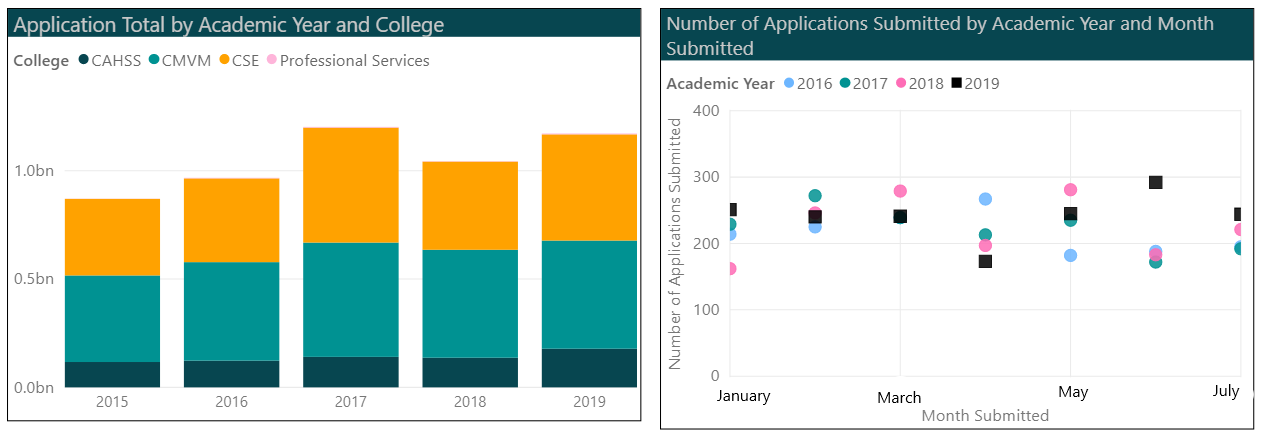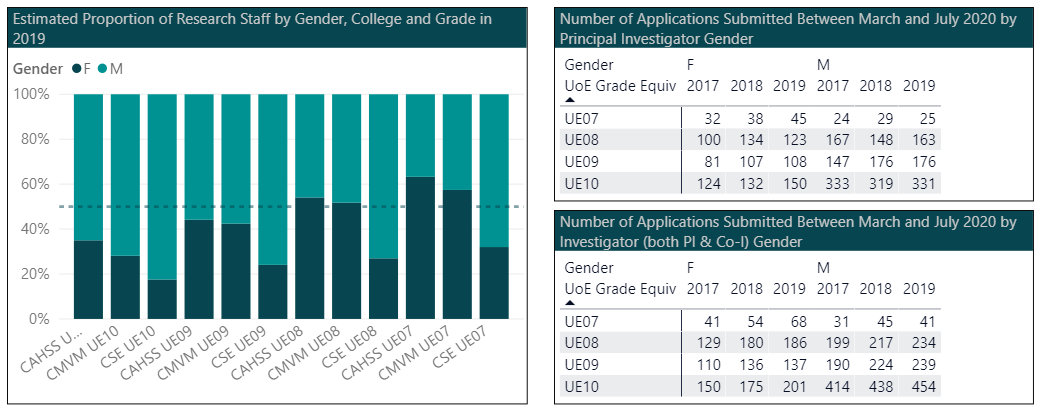Dr Louise Ker, Research Business Intelligence Officer, analyses preliminary data on the impact of the pandemic on research funding to date.
We have been working hard on our behind-the-scenes data engineering this year, pulling together information from multiple University systems to explore and understand our research activity. Within Edinburgh Research Office, we hold information on all the research applications submitted by and awarded to our researchers. This provides a good early indicator of the shape of our research base in coming years.
What happened to our research applications activity during March-July 2020?
Edinburgh is one of the largest research intensive universities in the UK, and typically our researchers submit over 2500 applications worth over £1billion every year.
Overall, the period March to July this year is very similar to previous years in terms of research application activity. However, month by month there were some noticeable differences.

Figure 1: Left: The value of all research grant applications Submitted over the Last Five Years. Right: The number of research grant applications submitted in the last six months.
- March recorded a higher value of applications submitted than in previous years.
- April saw a fall in both the number and value of applications submitted.
- June saw a marked increase in both number and value submitted.
Lockdown began towards the end of March – up until that point, it had been business as usual. Also during March, researchers submitted a number of applications to rapid response Covid-19 calls which increased the activity recorded. During April, many of our largest funders extended deadlines into May and June. This moved normal activity from April into the following two months. July and August to date look broadly similar to previous years.
Our registered successful awards to date also look broadly similar to previous years, only slightly down in Medicine, which we think may be due to a number of funder decision making panels being delayed in this area. Overall the team in Edinburgh Research Office have been busier than ever, and we are very heartened to see this activity continuing to grow into the new academic year.
Equality & diversity in funding applications: Is there any evidence of disproportionate impact on certain groups?
Gender

Figure 2: Left: The proportion of research active staff by Gender, Grade and College this year. Right: Number of applications submitted by gender and grade.
The numbers and proportion of women applying did not differ significantly over this period in comparison to similar periods in previous years. This remains true whether we look at Principal Investigators alone, or include both Principal and Co-Investigators. Does this mean there were no differing impacts by gender?
No.
Delving deeper into the data, there are three important observations:
- There is a ‘lag time’ on applications. An application formally submitted in April for example is likely to have had most of the groundwork underway some months previously. We will continue to monitor applications data by gender in the coming months for any emerging patterns or trends.
- Around 70% of application counts at the University are made by staff on the most senior grades. The average age for staff in these grades tends towards age 45 and above, and so it is likely that this staff group will have been potentially less affected overall by childcare impacts than those at less senior grades.
- Edinburgh, in common with most research intensive universities, has a significant underlying gender gap, particularly in the sciences subject areas.
Looking at research funding application data alone does not allow us to quantify the effect of lockdown on the significant proportion of female staff at earlier career stages.
What we can say, is that for those staff at the most senior level, where there is already a significant underlying gender difference, observationally, applications activity continued as normal across both genders during the first six months of the pandemic.
Ethnicity
At the moment, Edinburgh Research Office does not hold information on the ethnicity of applicants. We are working towards being able to do this in the future. However, the 2018/19 HESA Staff data suggests <7% of Professorial staff identify as BAME.
In common with many other sectors, the pandemic has shone a light on pre-existing equality disparities. These are likely to be exacerbated as the pandemic continues. The initiatives underway at the University to support equality will be central to our renewal work, see for example building gender equality into development projects, the eBASE project, and our recent work around Research Integrity and Responsible Research Evaluation.
Support for early career researchers
In response to the specific challenges faced by early career researchers during the Covid-19 pandemic, the Adaptation and Renewal ECR Team identified issues facing ECRs and University resources to address them. ECRs can find resources to support them on our Support for early-career researchers SharePoint page (UoE staff access only).
What does the future hold for research funding?
Safeguarding research depends on a robust and well-supported research base. Universities will need to work carefully with our partners, funders and Government to protect, diversify and strengthen the research base in the coming years.
A typical research application submitted in 2020, may not be awarded until 2021 and may receive income over several years into the future. This means that if funders have more or less funds to distribute in the immediate term, it may take several years for the cumulative impact of this to be seen at the University.
For example, medical charities, such as the British Heart Foundation and Cancer Research UK have faced considerable challenges since March and many are forecasting serious reductions in income. The threat to future medical research from this cannot be understated. Innovative ideas from across the funder and researcher landscape are required to safeguard research in this area. In recent weeks we have seen the Association of Medical Research Charities call for a ‘Life Sciences – Charities Partnership Fund’, a call supported by researchers from our Cancer Research Centre and major industrial funders, and Cancer Research UK has recently announced a new major global funding partnership to enable it to leverage and award large grants to multinational teams.
There will also be new opportunities for Universities, Business and Government. Sectors such as pharmaceuticals and biotechnology, digital and software development have boomed this year. Global health, equalities and climate change have never been higher up the agenda, and this is reflected in recent funding calls such as the EU Green Deal programme – see our recent blog post. Many Government and global decision-making bodies will be seeking evidence to support “building back better” over the coming year, see for example, the recent Scottish Affairs Committee call for evidence.
How do we “build back research better”?
There is a role for everyone who values our research.
- Talk about your research. It has never been more critical to talk about what we do as a University. Whether it is explaining the science on Twitter, contributing on National Boards, running webinars for the public or responding to calls for evidence, voices of University of Edinburgh staff are respected for their expertise across the globe. Be heard. Our Knowledge Exchange and Impact Team can help you engage with policy makers, practitioners, industry and the public.
- Seize the opportunities: The shape of our research in the years to come depends on the opportunities we pursue now. The change in work patterns and impacts on the economy mean that there is likely to be a renewed focus on both place and business. The digital skills base will be critical to rebuilding the economy. This is why we are choosing to invest in 30 new Chancellor’s Fellows posts, supported by some of the Covid-19 grants received from the Scottish Funding Council. We are seeing how challenges to existing funding, e.g. medical charities, raised by the pandemic are catalysing new approaches. Universities are uniquely well-placed to leverage partnerships across sectors and communities to aid new approaches, from local to international.
- Help us “build back” a resilient, curious and inclusive research community: The University has set up new initiatives over the last two years to focus on research integrity, improvement, responsible evaluation and culture. These will be central to our renewal of research plans. You will have recently seen our survey on Research Culture, and we will share the results of this with you soon.
This is one of the largest global challenges in the 400 year history of the University. We have risen to that challenge – if I had to pick just a few research examples that have inspired me, Devi Sridhar’s grounded and practical public health advice, the ISARIC and RECOVERY trials and Project Soothe come to mind.
There are substantial challenges and opportunities ahead. Taking the first steps towards adaptation now will safeguard and strengthen our research into the future. Better days are coming.



